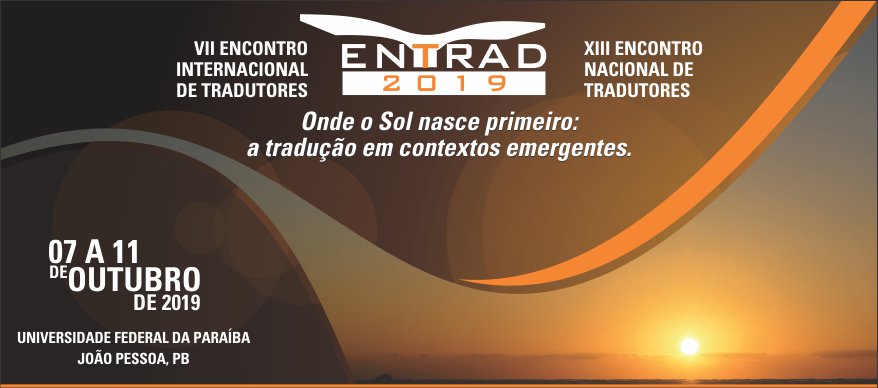Antes de se inscrever, leia as orientações AQUI
Adaptação e Tradução
Adaptation and Translation
John Milton
USP
jmilton@usp.br
http://lattes.cnpq.br/5756833764522214
Gisele Giandoni Wolkoff
UFF
gwolkoff@gmail.com
http://lattes.cnpq.br/4530644741441254
Yuri Jivago Amorim Caribé
UFPE
yuricaribe@hotmail.com
http://lattes.cnpq.br/7155829715636124
Idiomas de trabalho | Work languages: Português, English, Español
Resumo: Desde 2015 os integrantes do Grupo de Estudos de Adaptação e Tradução (GREAT – http://dgp.cnpq.br/dgp/espelhogrupo/1897787761898965) se reúnem com o objetivo de discutir e aprofundar seus conhecimentos sobre os temas da adaptação e da tradução. As reflexões realizadas ao longo desses encontros mostraram o quanto esses dois eixos temáticos são importantes para as sociedades e suas relações intra-social e intersociais. Assim, inspirando-se nas atividades do Grupo, a justificativa deste simpósio consiste em ampliar as discussões sobre essas duas áreas do saber, devido à constatada relevância político-sociocultural que possuem, para apresentar como os mais variados temas são abordados nos diferentes pontos de vista dos Estudos da Adaptação e da Tradução. As mais recentes perspectivas teóricas no campo dos Estudos de Adaptação – Robert Stam (2005), Linda Hutcheon (2006), Julie Sanders (2006), Simone Murray (2012), para citar alguns exemplos – ampliam o campo de pesquisa para além da tradicional relação literatura-cinema, incluindo outros gêneros como teatro, dança, música, teoria linguística, feminismos, psicanálise, interculturalidade, vlogs e outros meios de comunicação, quadrinhos etc., superando, com isso, o tradicional debate sobre fidelidade. Assim como esses estudos, o objetivo geral desse simpósio é debruçar-se no modo como um gênero é transformado em outro, adaptando-se com maior ou menor sucesso a diferentes mídias e contextos culturais; o objetivo específico consiste em alargar a discussão da tradução intralinguística, interlinguística, intersemiótica (Roman Jakobson, 1999) e, também, acrescentar discussões baseadas nos Estudos Culturais – intracultural e/ou intercultural, com o intuito de refletir como o gênero adaptado alcança um público heterogêneo por cultura, interesses, idade e classe social, assumindo uma nova dimensão e uma relevância diferente em relação à recepção obtida quando surgiu pela primeira vez. As comunicações se concentrarão em trabalhos que tratem sobre adaptação dos diversos gêneros em diferentes campos da criatividade humana, como, por exemplo, os trabalhos que analisam adaptação da literatura ao cinema, TV, arte, publicidade, videogames, entre outros, e vice-versa, e as línguas envolvidas serão não apenas as modernas, mas todas aquelas que mostrem o quão extensivos são os Estudos da Adaptação.
Palavras-chave: Adaptação;, Tradução;, Recepção
Abstract: Since 2015, the members of the Adaptation and Translation Studies Group (GREAT – http://dgp.cnpq.br/dgp/espelhogrupo/1897787761898965) have been meeting and discussing various areas of adaptation and translation, emphasising the relationship between the two fields, and organising the two Jornadas de Adaptação e Tradução congresses at USP in November 2015 and 2017. Thus, drawing inspiration from the Group’s activities, the justification for this symposium is to broaden the discussions on these two important areas of knowledge and to examine how a variety of topics are approached from the different points of view of Adaptation and Translation Studies. Recent theoretical perspectives in the field of Adaptation Studies – Robert Stam (2005), Linda Hutcheon (2006), Julie Sanders (2006), Simone Murray (2012), extend the field of research beyond traditional literature-related relationships to include other genres such as theatre, dance, music, linguistic theory, feminism, psychoanalysis, interculturality, vlogs and other media, comics etc., surpassing the traditional debate on fidelity. As in these areas, the overall aim of this symposium is to look at how one genre is transformed into another, being adapted with greater or lesser success to different media and cultural contexts and constraints; and the specific objective is to extend the discussion of intralinguistic, interlinguistic, intersemiotic translation (Roman Jakobson, 1999) and also to add discussions based on Cultural Studies – intracultural and / or intercultural, in order to discuss how the adapted genre reaches an heterogeneous audience in terms of culture, interests, age and social class, taking on a new dimension and importance in the target culture. The papers should focus on works that deal with the adaptation of different genres in different fields of human creativity, such as works that analyze the adaptation of literature to the cinema, TV, art, publicity, video games and vice versa, using both oral and artistic forms of language.
Keywords: Adaptation, Translation, Reception
Antes de se inscrever, leia as orientações AQUI
